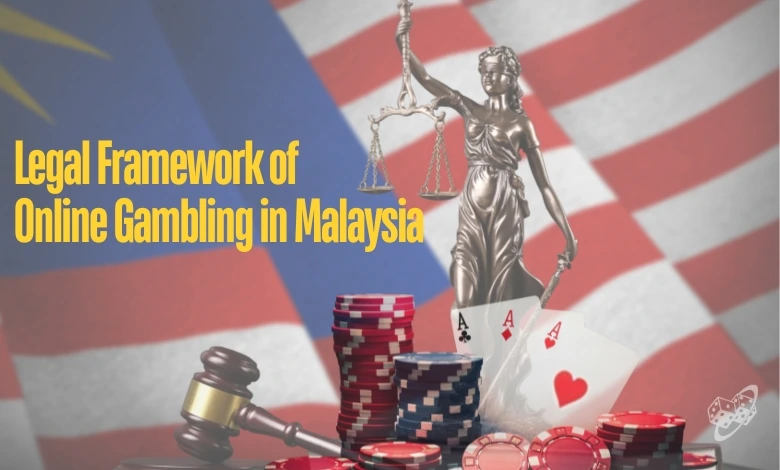
Legal Framework of Online Gambling in Malaysia
Online gambling has grown to be an important form of entertainment, attracting many players in Malaysia with an interest in virtual gaming. Understanding the legal framework of online gambling in Malaysia is required because this domain runs on the interplay between secular and Islamic laws. It revolves largely around the most basic legislation known as the Betting Act of 1953, banning most types of gambling but keeping the space relatively free for online activities, hence ambiguities. The current legal framework for online gambling in Malaysia demonstrates existing legislation and obstacles to the enforcement and compliance of regulation. This blog offers key recommendations for socially responsible gaming in Malaysia, so players know the risks involved and legal obligations within this changing space.

Table of Contents
Major Online Gambling Regulations in Malaysia
In Malaysia, traditional practices often incorporate casual gaming and informal betting, demonstrating how gambling in Malaysian culture is woven into social events and festivities. While legal restrictions are stringent, these cultural customs highlight the complex relationship between recreational gaming activities and regulatory frameworks.
In Malaysia, the main central legal frameworks for gambling are – the Betting Act of 1953, the Common Gaming Houses Act of 1953, and Shariah law. Of these, the most central is the Common Gaming Houses Act of 1953.
The Common Gaming Houses Act of 1953 is defined as – “The playing of any game of chance or a mixed chance and skill for money or money’s worth.” It tends to regulate such places where gaming activities are conducted to bring them within the ambit of the law.
Although normal usage under Malaysian law is not neat, it distinguishes between the term gambling, which means wagering on indeterminate outcomes for money, and gaming, which can include participation in games involving elements of skill or strategy along with chance.
The Legal Aspects of Online Lottery and Gambling in Malaysia are governed by the Lotteries Act of 1952, which implies that only licensed lotteries should operate legally. At present, there are six licensed lotteries owned by private entrepreneurs in Malaysia, and their activities are strictly controlled to ensure whatever they are doing is at par with adapting to the legal requirements.
The provision of the Lotteries Act 1952 states that operating permits from the Minister of Finance are required for lotteries falling within the public and private sectors to be operated for charitable causes. There are stringent accounting practices and duties on total proceeds, failing which there are penalties. The Act also gives the Minister of Finance powers to issue search warrants and to make regulations necessary to effectively give effect to the lottery rules.
The licensing is conducted by the Ministry of Finance’s Unit Kawalan Perjudian (the Betting Control Unit) which has very strict standards imposed on operators. Operators are expected to maintain financial stability, practice responsible gaming, and show integrity within the conduction of business.
Recent rises in taxes and duties levied on operating gambling have upped financial burdens on licensees, therefore affecting profit margins and probably changing the dynamics of the market.
Malaysia Online Gambling Laws and Regulations 2024 and Its Legal Ambiguities
Malaysian online gambling law overview and compliance characterize the current legal status of trusted online casinos in Malaysia Various legislation governed offline gambling, such as the Betting Act of 1953, Common Gaming Houses Act of 1953, Pool Betting Act of 1967, Lotteries Act of 1952, and Racing Club (Public Sweepstakes) Act of 1965, which more or less dealt only with physical gambling activities and did little to address online gambling.
The Betting Act of 1953 prohibits all betting activities if not licensed and regulates betting activity for telecommunications to transmit bets between customers and betting houses. The Common Gaming Houses Act of 1953 defines the criminalization of operating gaming houses, suppression of public gaming, and lotteries, giving penalties against those found in such places.
The 1967 Pool Betting Act provides for the licensing of pool betting and a governing Board. The 1952 Lotteries Act permits the running of lotteries in both the public as well as the private sector for charitable purposes through allowed permits. The 1965 Racing Club allows for betting on horse racing based on specific terms that were given and also sweepstakes on racing results.
These laws focus on traditional activities, therefore developing a gap in significant concern about online gambling platforms and Malaysian online sportsbooks. The gray area of regulation creates ambiguity in the sense that online gambling is not exactly legalized. However, many players access offshore online gambling sites without any legal ramifications.
Current regulatory approaches involve active Malaysian authorities in the limitation of access to these online platforms. The Malaysian Communications and Multimedia Commission bans websites connected with illegal online gambling, trying to prevent people from engaging in activities that are not approved by local laws. Sanctions also extend to those operating illegal online gambling schemes. This consistent enforcement underlines several complex situations and tensions within the now popular online gambling environment and an existing regulatory framework.
Emerging Trends: ‘Play to Earn’ and NFTs
The trend in Malaysia currently arises from P2E gaming, which has integrated the use of NFTs, opening up new frontiers in gaming. While one plays games for mere pleasure and rewards that are not valuable, with Play to Earn, a player can get real-world value via gaming.
NFTs have brought ownership into the dynamics of gambling, a role made possible through blockchain technology. Revenue in the NFT market of Malaysia could increase to about US$14340.00k by 2024. This model is vastly different from traditional gambling regarding how much a player could lose monetarily based on chance. P2E games focus on user participation and skill, minimizing gambling characteristics and potential legal complications.
While NFTs in gaming simply enhance ownership of the players, NFTs and Online Gambling Laws in Malaysia have further-reaching legal and regulatory implications. Due to the fact that NFTs represent one-of-a-kind digital assets, their use in the context of the gaming space could support a variety of questions regarding how they should be treated under pre-existing Malaysian law.
Since the issue of exchanging or otherwise using the NFTs is not caught by any existing regulations, gamers are easily able to engage in barter trades of NFTs without any legal complications, provided the payment terms are clear and within the compliance of local laws.
Historical Context and Evolution of Legal Framework in Online Gambling Malaysia
The beginning of gambling legislation in Malaysia traces back to the establishment of the Betting Act 1953 and Common Gaming Houses Act 1953-legislations which regulate the forms of gambling activities, including land-based ones. Such laws were established as a measure of control over the still budding gambling industry post-independence and were more often than not based on colonial influence and local behavior.
In the early years, regulations focused on more traditional gambling practices themselves, criminalizing those establishments that did not bear licenses while setting legal parameters for betting. Malaysia’s gambling laws are colored significantly by the influence of Sharia law, which prohibits gambling to its Muslim majority, therefore complicating the legal landscape further.
Historical developments in that direction, focusing so much on greater concerns about understanding the impact of Malaysian Online Gambling Laws on Play to Earn Games and Online Gambling Legislation in Malaysia, illegal gambling, and its social consequences, have grown over time into almost retaliatory kinds of regulation. Although a 2019 decree supposedly dealt with online gambling, comprehensive legislation has not been in place, hence the legal status is not clear.
Application of the existing laws to online platforms, though without specific binding regulations, marked important milestones in shaping the current legal framework. The government’s failure to update the legislation increased enforcement actions against illegal online gambling; though many players operate in a gray area where they navigate ambiguous legal grounds as the government tries to find a middle ground between regulations and public interest.
Conclusion
Going back to its roots, Malaysian gambling legislation moved from foundational legislation, represented by the Betting Act of 1953 and the Common Gaming Houses Act of 1953, toward modern challenges posed by online gaming and Sharia. Recent initiatives, such as the 2019 decree, have attempted to clear the ambiguities of online gambling, but broad regulations have yet to be provided for most activities to keep them in a gray area. The nature of this regulatory framework is evolutionary, and hence it is even more significant that one stays updated on the work in the development of laws.
This means that, while society and technology continue to evolve, understanding online gambling legislation in Malaysia and its regulations must also change to move forward with such developments and ensure that all forms of gambling-both old and new, including online platforms are regulated in a timely and coherent way to protect consumers and the integrity of the industry.
FAQs
Is online gambling legal in Malaysia?
It is illegal to gamble in Malaysia as the Common Gaming Houses Act 1953(CGHA) and the Betting Act 1953 do not allow any form of gambling which also includes online gambling.
Which laws cover gambling in Malaysia?
The major act – The Betting Act 1953 (which has undergone many amendments) bans any form of gambling unless the company possesses a legal license to operate.
What are the regulatory challenges?
A few legal challenges of Online Casino Gambling in Malaysia include – Trade surveillance, ESG compliance, Compliance oversight, Control room compliance, Conduct risk, Corporate Compliance, Conflict of interest management, Anti-bribery, and corruption.









